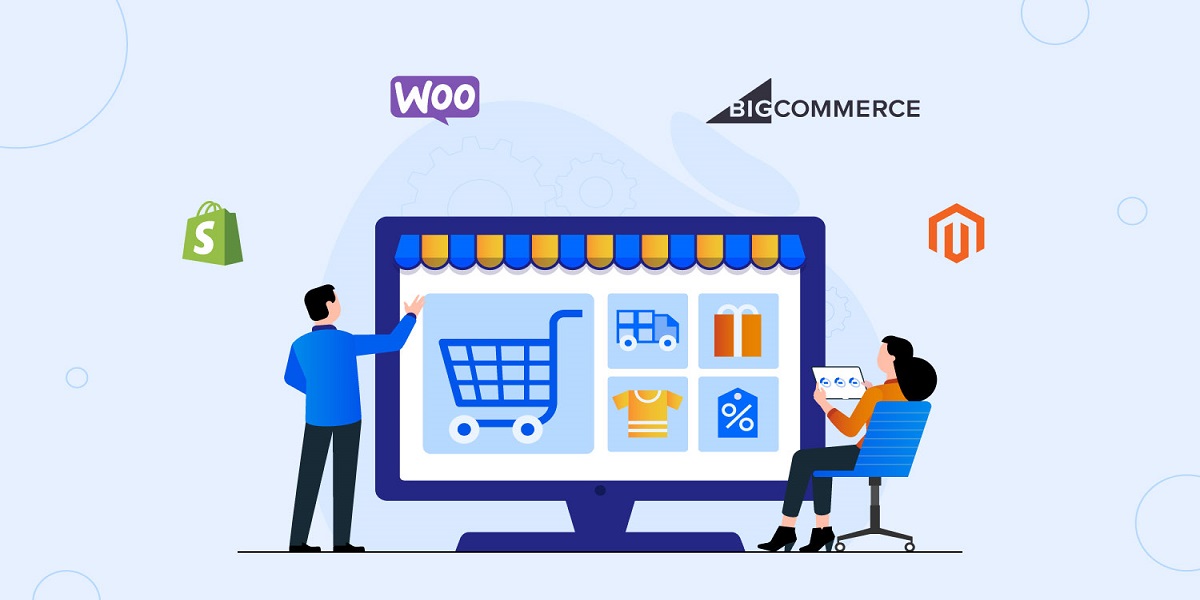
There are currently over 120 ecommerce systems available, each with its advantages and disadvantages. An assessment of the different platforms is necessary to see which works best for your business before deciding on the most advanced ecommerce platform. We have listed our top 8 factors to consider before choosing an ecommerce platform for your business.
What are the main factors to consider when developing an eCommerce presence?
Price and Payment Options
Pricing is an essential factor to consider while choosing an ecommerce platform. Whether you're a new small business or an established brick-and-mortar company migrating online, you need to know precisely how much you'll be spending.
A monthly fee is charged on almost all platforms. The price may vary depending on your chosen platform (self-hosted vs. hosted). You should also take into account the platform's processing costs. Don't skimp on essentials in exchange for a lower price. To obtain the best deal, assess the benefits and drawbacks of each option.
While Shopify is best for company owners that need a lot of functionality and add-ons in their app, Volusion is more focused on selling. BigCommerce is ideal for SEO, and 3dcart comes with helpful features that facilitate excellent building & management of eCommerce shops.
Compare the prices of various platforms - within the framework of their relative benefits & drawbacks - and then choose the most suited.
Features/Integrations
The functionality available on various systems will differ. Some platforms have built-in marketing tools like newsletters, abandoned cart emails, incentive programs, daily discounts, etc., besides the basic ecommerce capabilities.
App integrations, such as Mailchimp or Shipstation, should be able to replace any built-in functionalities on an ecommerce platform. You'll come across a set of required integrations and plugins that are universal across all eCommerce platforms. However, you should choose a platform that offers relevant integrations and plugins.
Security
Security has to be the topmost priority in eCommerce. Ecommerce companies owe an obligation to their customers to keep their personal information safe, which entails ensuring PCI compliance, SSL, fraud prevention, and data backups for your ecommerce platform. From the start, make sure your ecommerce website is secure against hacking and data theft.
You should choose a platform written in an object-oriented programming language since such platforms have inherent security mechanisms.
Magento and Shopify are well-known platforms emphasizing two-factor authentication to lower website risk. Security plugins can offer extra security to systems that don't have multi-factor authentication for critical data protection.
SEO Friendliness
Customers will only visit your website if they can find your store in search engines when looking for items similar to the ones you provide. SEO (Search Engine Optimization) is essential to improve your site's ranking and visibility in the search engines.
As a result, the platform you select should include capabilities such as allowing users to create a product's meta description, adding a blog to their website, utilizing their domain name, allowing consumers to give reviews, Google site map compatibility, and so on. These elements in the platform will directly influence your website's SEO rankings.
When looking for an SEO-friendly platform, consider the following factors:
The ability to include a blog on your webpage
Being able to utilize your domain name is a huge plus.
Customers' opportunity to provide feedback
Customer Service/Technical Support
Software failures and server downtimes are often beyond your control, preventing any of your clients from accessing your business. Your servers may likely collapse at the most inopportune time, impacting your earnings and your brand's reputation. You will lose revenue if your consumers cannot visit your website or finish a purchase.
Scalability
Your eCommerce firm will expand with time. As a result, you should select a platform that can grow with your company. Furthermore, the platform should not demand unreasonable prices for additional functionality and storage to accommodate your growing business needs. Every business owner hopes that their company will expand in the future, without knowing how much. Nonetheless, finding a platform that will grow with your company is critical. Choose a platform that will allow you to expand your business without charging you exorbitant costs for services or storage that you won’t use.
Responsive Web Design
If eCommerce companies want a desktop and mobile site, they will have to handle separate marketing campaigns, ads, product information, catalogs, and so on. As a result, their costs will rise, and their resources will be depleted.
A responsive web design automatically adjusts a site to the screen sizes of multiple devices such as desktops, laptops, mobile phones, and tablets, which is a better and more cost-effective alternative to a separate desktop and mobile site. As a result, responsive web design enables you to give an incredible user experience regardless of the device.
Multiple Selling Channels
An eCommerce store's revenue may be increased by supplying products/services through several selling channels. As a result, you should pick a platform that allows you to offer items or services across various channels, such as Facebook Messenger, Instagram, and Amazon, among others.
Some top multi-channel eCommerce systems are Shopify, WooCommerce, BigCommerce, Magento, and PrestaShop. These technologies let you generate various selling choices in online marketplaces and increase income by offering centralized control of your inventory data.
Takeaway
The retail business will witness a massive growth in B2C e-commerce over the next five years, with worldwide sales estimated to increase by 85 percent by 2023 compared to 2019. This significant surge directly affects the coronavirus (COVID-19) pandemic's acceleration.
Finding the right partner for your ecommerce platform is, therefore, a challenge. Do your homework first. Setting up your web presence, importing your products, and choosing a theme might take time away from other elements of your business. Make sure you make the best selection possible to address the above challenges.
Using an ecommerce platform that fully incorporates all parts of your business enables more efficient operations and helps you expand your company.
